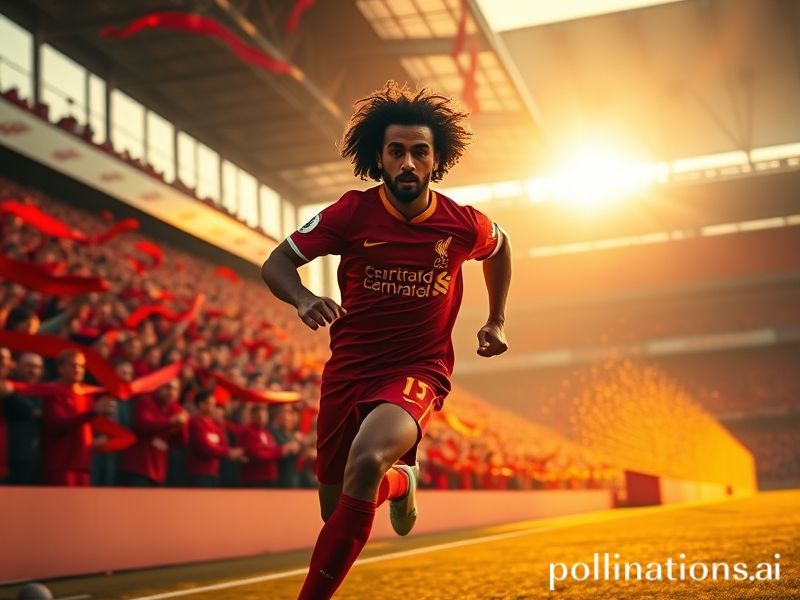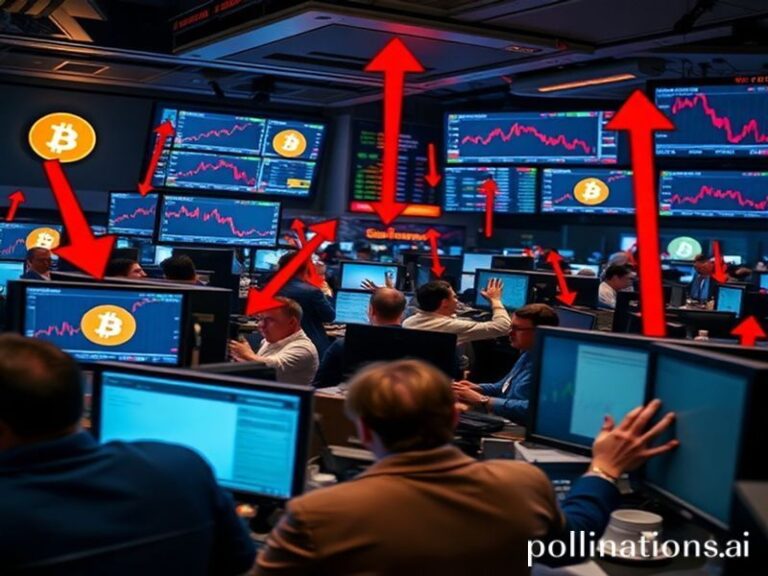Mohamed Salah: The Egyptian Meteor Rewriting Global Football While Europe Watches Its Own Script Burn
Mohamed Salah: The Pharaoh Who Flipped FIFA’s Script on Its Head
By Dave’s most jet-lagged correspondent, still smelling of Cairo airport kofta
There’s a moment, usually around the 73rd minute, when Mohamed Salah decides the universe has procrastinated long enough and hits warp speed. Defenders—men who have trained since infancy to stop exactly this sort of thing—suddenly look like they’re wearing concrete galoshes on a moving walkway. Television directors cut to slow-motion replays, mostly because the human eye isn’t insured for that kind of acceleration. Meanwhile, in living rooms from Lagos to Liverpool, bar owners silently calculate how many more TVs they can justify buying before the next Salah-shaped miracle detonates their monthly electricity bill.
Salah’s genius is inconvenient for the tidy narratives football likes to sell. The sport’s marketing departments spent decades packaging “global icons” as either European demigods or Latin sorcery; then a kid from Nagrig, population 15,000 and one unreliable water pump, rewrote the algorithm in real time. He scores goals with the frequency of push notifications, celebrates with a sujood that makes every geopolitics professor clutch their pearls, and somehow still finds time to bankroll hospitals back home while the rest of us can’t even remember our Wi-Fi passwords. It’s all deeply unfair to the rest of humanity, but nobody said the cosmos plays fair—just ask whichever defender Salah turned inside out last weekend.
On the geopolitical scoreboard, Salah’s influence is the kind of soft power Western think tanks spend millions trying to bottle. Egypt—often introduced in headlines as “the most populous Arab nation, struggling with…” (insert crisis of the week)—gets rebranded, however briefly, as the country that exports 5-foot-9 miracles. Satellite dishes sprout on rooftops across the Sahel the way mushrooms pop up after rain, all angled toward whatever channel is promising a glimpse of Salah’s left foot. IMF economists probably have a metric for this, filed under “intangible national morale—unquantifiable but suspiciously correlated with reduced riot probability.”
Europe, meanwhile, can’t decide whether it’s amused or alarmed. Britain spent centuries convincing itself that empire was a civilizing mission; now Merseyside taxi drivers quote Quranic verses they learned from a footballer’s Instagram stories. Italy—never a country to underplay aesthetic drama—still wakes up in cold sweats remembering the 2017-18 season when Salah turned Serie A defenses into interpretive dance troupes. And in Spain, Real Madrid’s accountants maintain an emergency spreadsheet labeled “Salah contingency,” which is corporate speak for “panic-buy whoever looks slightly Egyptian.”
The truly delicious irony is that Salah’s story undercuts the very global supply chain that produced him. European clubs have spent decades strip-mining Africa for raw talent, shipping teenagers across the Mediterranean like so much human coltan. Salah—polite, teetotal, suspiciously scandal-free—slipped through that machine, sharpened himself on its gears, and now sells it back to us at a 400-percent markup. Every time he scores, a hedge-fund analyst somewhere has to update the risk model on “brand value erosion due to uncontrolled athlete authenticity.” That sound you hear is champagne popping in every branding agency that spent 2023 trying to teach 19-year-olds how to appear “socially conscious” without actually reading the news.
Yet the cynic in me—nurtured on airport sushi and three-delay itineraries—wonders how long the spell lasts. Modern fame is a lot like modern bread: soft, over-processed, and prone to molding overnight. Salah’s 31 now, an age when hamstrings start filing workplace grievances, and Liverpool’s accountants already practice their sad faces for the inevitable contract renegotiation. But perhaps that’s the final joke: in an era when everything from democracy to the polar ice caps seems to have an expiration date, Salah keeps scoring goals that feel suspiciously permanent.
So here’s to Mohamed Salah: the man who turned a village no GPS could find into a dot on every world map, who made kneeling cool again, and who reminds us—between nutmegs and philanthropic receipts—that sometimes the universe lets the good guy win, if only to maintain plausible deniability for the rest of the chaos. May his hamstrings stay elastic and his accountant continue to embarrass oligarchs. The rest of us will just keep refreshing our feeds, waiting for the next replay that proves miracles still ship worldwide, no customs declaration required.







